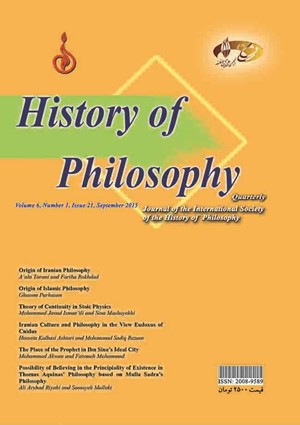-
-
List of Articles
-
Open Access Article
1 - foreword
Hossein Kalbasi Ashtari -
Open Access Article
2 - Origin of Iranian Philosophy
A‘ala Torani Fariba Rokhdad -
Open Access Article
3 - Origin of Islamic Philosophy
Ghasem Purhassan -
Open Access Article
4 - Theory of Continuity in Stoic Physics
Mohammad Javad Esmaeili Sina Masheyekhi -
Open Access Article
5 - Iranian Culture and Philosophy in the View Eudoxus of Cnidus
Hossein Kalbasi Ashtari Mohammad Sadiq Rezaee -
Open Access Article
6 - The Place of the Prophet in Ibn Sina’s Ideal City
Mohammad Akvan Fatemeh Mohammad -
Open Access Article
7 - Philosophy based on Mulla Sadra’s Philosophy
Ali Arshad Riyahi Somayeh Malleki
-
The rights to this website are owned by the Raimag Press Management System.
Copyright © 2017-2026







